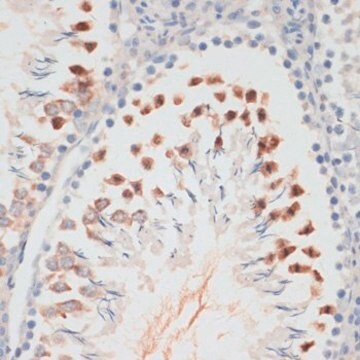ZRB1557
Anti-phospho-GSK3β Ser9 Antibody, clone 6K18 ZooMAb® Rabbit Monoclonal

recombinant, expressed in HEK 293 cells
Synonym(s):
Glycogen synthase kinase-3 beta
About This Item
Recommended Products
biological source
rabbit
Quality Level
recombinant
expressed in HEK 293 cells
conjugate
unconjugated
antibody form
purified antibody
antibody product type
primary antibodies
clone
6K18, recombinant monoclonal
description
recombinant, expressed in HEK 293 cells
product line
ZooMAb® learn more
form
lyophilized
mol wt
calculated mol wt 46.74 kDa
observed mol wt ~45 kDa
purified by
using Protein A
species reactivity
human, mouse
species reactivity (predicted by homology)
rat
packaging
antibody small pack of 25 μL
greener alternative product characteristics
Waste Prevention
Designing Safer Chemicals
Design for Energy Efficiency
Learn more about the Principles of Green Chemistry.
enhanced validation
recombinant expression
Learn more about Antibody Enhanced Validation
sustainability
Greener Alternative Product
technique(s)
immunocytochemistry: suitable
peptide synthesis: suitable
western blot: suitable
dilution
(Peptide Inhibition assay)
isotype
IgG
epitope sequence
N-terminal
Protein ID accession no.
UniProt accession no.
greener alternative category
shipped in
ambient
storage temp.
2-8°C
target post-translational modification
phosphorylation (pSer9)
Gene Information
human ... GSK3B(2932)
General description
Each ZooMAb® antibody is manufactured using our proprietary recombinant expression system, purified to homogeneity, and precisely dispensed to produce robust and highly reproducible lot-to-lot consistency. Only top-performing clones are released for use by researchers. Each antibody is validated for high specificity and affinity across multiple applications, including its most commonly used application. ZooMAb® antibodies are reliably available and ready to ship when you need them.
Specificity
Immunogen
Application
Evaluated by Western Blotting in lysate from HeLa cells treated with phorbol 12-myristate 13-acetate (PMA).
Western Blotting Analysis (WB): A 1:10,000 dilution of this antibody detected GSK-3β phosphorylated on serine 9 in lysate from HeLa cells treated with phorbol 12-myristate 13-acetate (PMA; 500 nM; 30 min).
Tested applications
Western Blotting Analysis: A 1:10,000 dilution from a representative lot detected phospho-GSK3β Ser9 in lysate from NIH3T3 cells treated with PDGF.
Immunocytochemistry Analysis: A 1:100 dilution from a representative lot detected phospho-GSK3β-Ser9 in HeLa cells treated with phorbol 12-myristate 13-acetate (PMA)..
Peptide Inhibition Assay: Target band detection in lysate from HeLa cell treated with phorbol 12-myristate 13-acetate m(PMA) was prevented by preblocking of a representative lot with the immunogen phosphopeptide, but not the corresponding non-phosphopeptide.
Note: Actual optimal working dilutions must be determined by end user as specimens, and experimental conditions may vary with the end user
Target description
Physical form
Reconstitution
Storage and Stability
Legal Information
Disclaimer
Not finding the right product?
Try our Product Selector Tool.
Storage Class Code
11 - Combustible Solids
WGK
WGK 1
Flash Point(F)
Not applicable
Flash Point(C)
Not applicable
Certificates of Analysis (COA)
Search for Certificates of Analysis (COA) by entering the products Lot/Batch Number. Lot and Batch Numbers can be found on a product’s label following the words ‘Lot’ or ‘Batch’.
Already Own This Product?
Find documentation for the products that you have recently purchased in the Document Library.
Our team of scientists has experience in all areas of research including Life Science, Material Science, Chemical Synthesis, Chromatography, Analytical and many others.
Contact Technical Service






